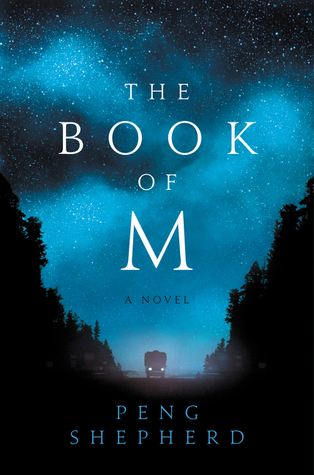Where did the shadows go? Ory wondered. He didn't even care about the why any more. Only the where. The why was inexplicable. Ory didn't believe in magic, but he knew in his heart that what had happened was nothing that could be understood by humans. It was no natural disaster, no disease, no biological weapon. The best name he'd ever heard for it was curse. Because in the end it didn't matter who you were. No one escaped – either because they were someone who lost their shadow, or because they were someone who loved someone who lost their shadow.
In The Book of M's future world, through some inexplicable and magical process, people start to lose their shadows, and with them, their memories. This “Forgetting” is tragic but also dangerous: sometimes when a shadowless person realises that they have forgotten an important memory, that distant person or place simply disappears. And sometimes when a shadowless person misremembers something, people and objects and places can be transformed into monstrous, nightmare versions of themselves. This all sets up a familiar zombieland us-vs-them scenario with the unaffected constantly reassuring themselves that they still have shadows as they choose to avoid or fight the shadowless, but with no set rules for how a person transforms (it's not a contagion, spontaneously occurs, and doesn't affect everyone in a group) and with unbounded magic that some of the shadowless eventually learn to harness in deus ex machina plot-meddling, the “magic” supplants “logic” to the detriment of the narrative; when anything could happen, I stopped caring what did.
The Red King was the size of two men, over ten feet tall, wearing a scarlet cloak of a hundred layers and haphazard armor made from whole, bent steel doors. A human skull could fit inside each scarred, crimson hand. Red dripped off him from everywhere, leaving trails behind him.The book is told from four shifting POVs: Max (with her husband Ory) has been hiding out in the woods for two years since the Forgetting, but now that she has suddenly lost her shadow, she has decided to run away in order to keep him safe from what she might unwittingly do (Ory has given his wife a tape recorder to help her keep her memories, and what she records on her adventure as her memory falters was my favourite thread); Ory, naturally, is determined to find Max, and he faces constant danger in pursuit of her; Naz is an Iranian-born Olympic archer, training in Boston at the time of the Forgetting, and she faces constant danger in an effort to stay alive; and "the amnesiac” was under the care of a memory doctor when the Forgetting began, and as he met and interacted with the first man who ever lost his shadow, this nameless one might hold the key to a cure. When rumours and graffiti all seem to point to the presence of a mysterious prophet in New Orleans, those with shadows and those without begin a pilgrimage that see the storylines converge.
Later, he came to have many names. The One With a Middle but No Beginning. The Stillmind. Patient RA. Last, most important of all – The One Who Gathers. But in the beginning, he had no name at all.This convergence made me think of Stephen King and The Stand; and being Stephen King, he can be forgiven for bringing in supernatural elements; for setting up an ultimate battle between good and evil (but even he had his dystopia start with a simple virus). But that ultimate battle isn't really what author Peng Shepherd is going for in The Book of M – and my biggest complaint would be that I don't know what she was going for. Post-apocalyptic fiction can be wonderful for exploring how humans behave once civilisation collapses (as in The Road or Station Eleven), but between an army risking their lives to collect books and a murderous cult trying to “transcend”, I didn't connect with any recognisable motivations. And post-apocalyptic fiction can make for fun and adventuresome storytelling (as in The Passage or The Strain), but there have to be rules: inexplicable transmission and human people suddenly being able to transform reality with their minds drain the tension for me (and those were my biggest complaints about The Marrow Thieves, too; The Power followed rules, so it worked better for me). Okay, let's accept that people can lose their shadows, but how (or why) are memories stored there? I can't accept the basic premise and having more than one character shrug and say it's magic doesn't cut it for me.
Madness, Zhang thought. An army of shadowed people led by a shadowless, who wanted to remove all human shade from the world – against a council of shadowless, led by a living shadow, who wanted to give everyone back their dark twin.Madness. In the last few dozen pages of the book, Shepherd approaches something like a point: if people's memories – their personalities, if not their souls; a word never mentioned – are stored outside of their physical selves, then what is the body? To avoid spoilers, I'll frame it as: If your best friend became a zombie and threatened a near stranger, but not yourself, could you look into her familiar eyes as you plunged a knife into her heart? If you could wish upon a monkey's paw to raise your child from the dead, but the child returned with someone else's memories, is that still your child? I liked that Shepherd referenced Peter Pan and a Hindu legend about the sun king and his shadow wife, but there isn't a lot of intertextual background for what happens, no scientific explanations, and next to no philosophical exploration after the fact: things happen, magical meddling constantly subverts any logic, and we get to the end. Yes, some interesting things happen, but it wasn't enough for me.

